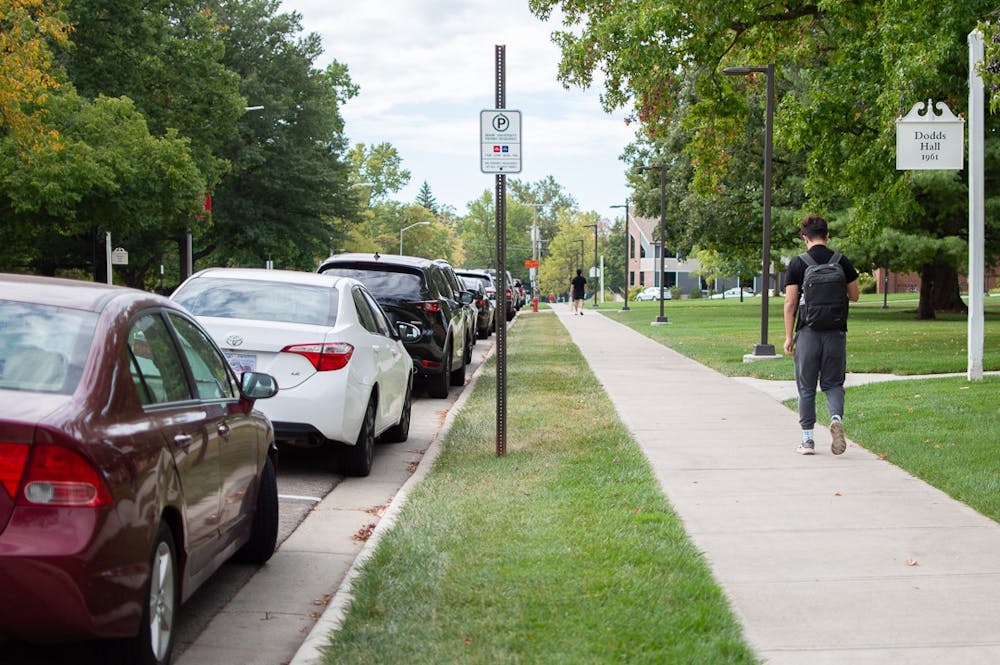Junior track runner Sydney Harmon registered for an accessible pass to drive her injured teammate, parked in designated spots and still received six parking tickets. Her permit didn’t show up in the system, so she contested each ticket hoping she wouldn’t have to pay the hefty fines.
Miami University collected $1.9 million during the 2023-2024 academic year from parking permit sales and citation fines, according to the Miami University Police Department (MUPD). In 2023, however, the City of Oxford collected only $980,000 from metered parking and citations.
Parking citations for the City of Oxford cost $10 to $15 while Miami parking charges $75. This steep price per ticket makes parking a highly contested topic on campus.
Harmon has received seven total parking citations from Miami, and each time she tried to get them resolved.
“I’d have to call them hoping that a person could answer my question, they’d tell me to send an email and then they wouldn’t respond to my email for two or three weeks,” Harmon said. “... It caused me a lot of anxiety.”
Four to five officers patrol parking daily, MUPD Captain Andy Rosenberger said. The parking truck, with cameras on top, processes each license plate it passes, and then the plate is automatically run through the system to verify that it’s linked to a permit. This is why the license plate facing outward is vital in permit parking lots.
The University sets the pricing structure for parking permits and fines, while it's parking services that issues citations and fines. The parking appeals review committee then reviews the appeals. Rosenberger, who is in charge of parking at Miami, said he recognizes that tickets are expensive.
“I didn’t set that price,” Rosenberger said. “But if you look at other universities their permits are usually more expensive, so ours are less expensive and our fines are more.”
Junior arts entrepreneurship and management major Anna Carine, who has received multiple parking citations in the Millett lot, said she thinks the citation fine is high.
“Getting to the parking lot and seeing so many student’s cars with $75 tickets left a really bad taste in my mouth,” Carine said.
Each year Miami also collects approximately $1.2 million from parking permit sales to faculty, students and visitors.
Rosenberger said Miami sells approximately 3,000 student parking passes per year out of the 3,500 student parking spaces available. The three main parking lots for students include Millett, Ditmer and Chestnut. Semester parking passes for these yellow lots cost $100.
Enjoy what you're reading?
Signup for our newsletter
Rosenberger said that most of the $1.9 million are used for restriping parking spaces, resurfacing, maintaining the garage gates, paying for parking software, paying for parking meters, paying hourly wage and paying the parking staff that takes customer service phone calls. The university generates some profit, as well
First years living more than 200 miles away are allowed to bring cars to campus. Those students, and many sophomores, buy most of the parking permits.
“I think that $200 per year and $100 per semester is crazy when the parking isn’t even that great,” Harmon said. “It just feels like a way for people to make more money.”
One semester parking permit costs $25 more than a parking citation.
“That’s alarming. I feel like it shouldn’t almost match the price of the permit,” Carine said.
In the three years since Rosenberger has overseen parking, he has made multiple policy changes after hearing feedback. A parking advisory board with parking personnel, students and professors meet two to three times per year to discuss parking-related issues.
“We kind of juggle this struggle of trying to keep people happy,” Rosenberger said, “so I like to get as much input as I can and then adjust.”
The available parking lots are all on the outskirts of campus with metered parking being the main option near The Shriver Center and Armstrong Student Center.
Harmon said the lack of parking spaces in specific parts of campus doesn’t reflect the cost of a pass.
“There should be more parking because you can only park in certain lots and in certain places at certain times, and if you’re paying $200 for that there should be more parking,” Harmon said.
Rosenberger also agrees that more parking in the center of campus would be helpful.
“There’s not a good centralized parking lot, but I wish there was,” Rosenberger said. “I wish we had a giant parking garage in the center of campus, that would be amazing, it would make my job easier and make everyone happier.”
In the first two weeks of the school year, Miami issues warnings instead of citations, unless a car is blocking a fire hydrant or posing a safety risk.
“I think we’re getting there,” Rosenberger said, “but it’s not perfect obviously if we’re bringing that kind of money in from citations.”




